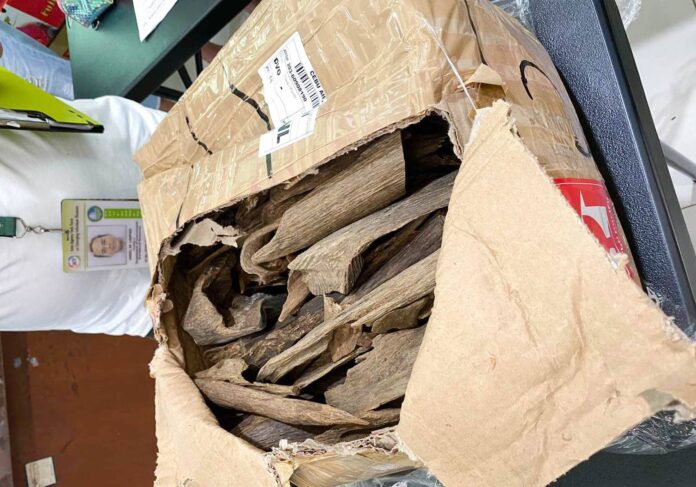-
Bureau of Customs (BOC) prevented the illegal export of six boxes of agarwood worth P62 million
-
The packages were declared to contain “woodcrafts” and bound for Vietnam via NAIA
-
X-ray scanning and physical inspection revealed 73 kilograms of agarwood chips set to be illegally exported without the necessary permits from DENR
The Bureau of Customs (BOC) has prevented another attempt to smuggle agarwood as it foiled the illegal exportation of six boxes of the rare and expensive type of wood worth P62 million.
The close coordination between the BOC collection districts of Port of Davao and Ninoy Aquino International Airport (NAIA), Davao International Airport (DIA), Philippine National Police-Aviation Security Group, and Department of Environment and Natural Resources (DENR) Region XI on December 24 resulted in the seizure of the six boxes of agarwood.
The packages were initially declared to contain “woodcrafts,” and were bound for Vietnam via NAIA, BOC said in a statement.
X-ray scanning and physical inspection, however, revealed the packages actually contained 73 kilograms (kg) of agarwood chips for illegal exportation to Vietnam without the necessary permits from DENR, BOC said.
The seized packages will undergo seizure and forfeiture proceedings for violation of Section 117 (Regulated Shipments), Section 1400 (Misdeclaration) and Section 1113 (Property Subject to Seizure and Forfeiture) of Republic Act (RA) No. 10863, or the Customs Modernization and Tariff Act, in relation to Section 27 (i) [Illegal Transport] of RA 9147, or the Wildlife Resources Conservation and Protection Act.
The seized agarwood will be turned over to DENR.
In two separate seizures earlier this month, BOC also intercepted three packages containing 28 kg of agarwood worth P2.4 million in a warehouse in Pasay City, and a shipment of 671 pieces of agarwood chips worth P1.72 million. Both packages and shipment of agarwood were to be exported without proper permits.
DENR earlier stressed that selling of agarwood or lapnisan from the Philippines is illegal.
Agarwood is found only in the heart of the jungles of Mindanao and Visayas and is classified under the Convention on International Trade in Endangered Species of Wild Flora and Fauna and included in the National List of Threatened Philippine Plants per DENR Administrative Order No. 2007-01.
Agarwood produces a resin that is valued for its distinctive fragrance and is formed when the host tree becomes infected with a mold called Phialophora parasitica. The mold infection makes the tree produce a dark aromatic resin called aloes or aga in its heartwood. The fragrant resin is used to make incense, perfume, and medicinal products particularly in the Middle East and Asia.
BOC noted that foreigners are said to hike to remote villages in the Philippines to find the rare tree. According to reports, the wood is one of the rarest and most expensive in the world, with a kilo fetching as much as P750,000.





